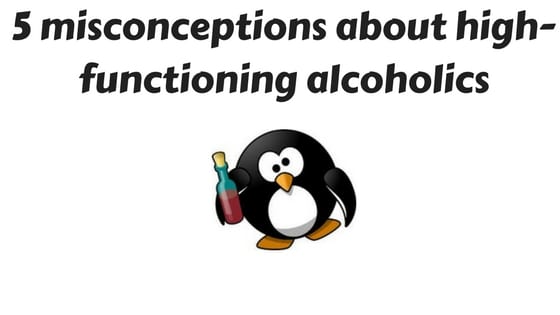
When someone thinks of an alcoholic they may imagine someone with messed up clothes, bad hair, no job, and maybe no place to live. This is often far from the case. Contrary to this stereotype, alcoholics are often very intelligent and successful, but have a drinking problem they cannot control.
The term “functioning alcoholic” was coined to describe someone who is addicted to alcohol, but can keep a job, keep their families intact, and take care of most of their responsibilities.
Here are a 5 common misconceptions about high-functioning alcoholics:
One of the most common misconceptions about functioning alcoholics is that they don’t need treatment. Because they are taking care of their responsibilities it is not always obvious how badly they are in need of help.
Why do they have a drink every day after work? Functioning alcoholics sometimes suffer from mental illnesses such as depression and anxiety without realizing it. A stressful lifestyle might distract them from their personal issues, and when they get home they feel justified to drink because their day was hectic. However, they are only putting off their unresolved issues.
If you or someone you know is a functioning alcoholic, you may say that because you don’t drink during the week or because you only drink wine or beer that it is under control . However, these “limitations” are exactly what makes a person a functioning alcoholic because he or she is able to manage the abuse through these self-imposed rules. By presenting boundaries to outsiders, they make it seem like they have a handle on their situation when in reality they break their own rules when they are out of the public eye. Functioning alcoholics will often avoid social events or family gatherings so others do not see their real habits. This is yet another aspect of their lives that they can effectively control.
Sure, many functioning alcoholics are educated and successful people. However, they may either be too ashamed of their habits or blind to the alcoholism to ask for help. Their pride can make it nearly impossible to talk to them about their alcoholism because they are usually deep in denial by that time and cannot be convinced of anything. Many people will naturally take offense to someone trying to tell them what they need to do, especially when they feel that they have everything under control.
Though you may see a calm and smiling person on the outside when he or she realizes there is no booze at the party, there is a storm raging on the inside for the high-functioning alcoholic. This is a part of the façade that functional alcoholics try to maintain to keep others from suspecting their alcoholism. Functional alcoholics will become irritable and may cancel plans that do not involve alcohol since most need the substance around to feel relaxed.
How long does cocaine stay in your system – and why do some people test…
It’s a sweet, syrupy mixture that has been celebrated in rap music for decades. But…
Meaningful discussions of LGBTQ+ and addiction must address the unique challenges faced by members of…
Alcohol abuse can put a person at risk for a broad scope of serious health…
In certain circumstances, stimulants such as dextroamphetamine and Adderall can help a person experience improved…
SMART Recovery is an alternative to AA and NA for people who are looking for…
This website uses cookies.